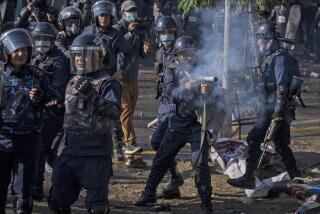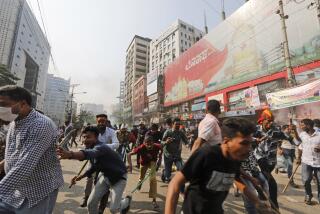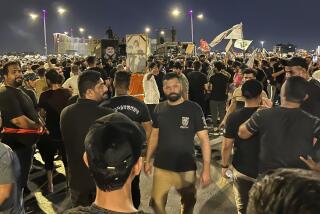Bahraini government lifts emergency rule
Bahrain on Wednesday lifted the emergency rule it imposed in March during a crackdown on widespread protests for democratic reform dominated by the island nation’s Shiite Muslim majority.
On Wednesday, much of the military pulled out of Manama, the capital, though police-manned checkpoints across the city remained. At least 30 people have died and hundreds have been arrested since the protests began in February, according to human rights groups.
King Hamed ibn Isa Khalifa expressed hope in a speech the previous day that his subjects could open a new chapter after months of discord. But early signs augured a rocky road as demonstrators Wednesday again tried to assemble only to be sent running by security forces. The emergency rule prohibited rallies.
“There were several protests and they were attacked with unnecessary force by riot police. The protesters are afraid to go to the hospitals because they are manned by the security forces. So people are treating themselves in their home,” said Maryam Khawaja, with the Bahrain Center for Human Rights. Other activists described the police as firing shotguns, tear gas and sound grenades.
Protests calling for political freedoms, better jobs, government accountability and an end to corruption and discrimination began in February, inspired by similar movements in Egypt and Tunisia.
The protesters, many of them well educated and middle class, were lobbying for a more representative government, demanding a bigger voice for the country’s Shiites, who make up an estimated 60% of the population but have little say in the Sunni-led government.
The country, allied with neighbor Saudi Arabia, portrayed the protests as part of a regional tug of war between Sunni powers and Shiite Iran. Washington views the island nation, which hosts the U.S. Navy’s 5th Fleet, as a strategic asset.
Many of the protesters, who included Sunnis, congregated at Manama’s Pearl Square, a major traffic circle that came to symbolize their aspirations of using “people power” to bring about peaceful change.
But by mid-March, the balance tipped and hard-liners in Bahrain’s royal family won out over moderates. Military forces and police from Saudi Arabia and the United Arab Emirates were called in and martial law was declared.
The square’s statue of a pearl held up by curving columns, a national monument, was blown up, and as many as 1,000 people have since been detained, including moderate secular Sunni and Shiite politicians, who had sought peaceful dialogue. Dozens of Shiite mosques were razed and the country’s main opposition newspaper was shuttered. State television engaged in a campaign to discredit the protesters with allegations of an Iranian-backed plot to take over the country.
Even as the king spoke of a national dialogue that would begin July 1, his government summoned a leading human rights activist, Nabeel Rajab, to a military court for questioning.
Many observers remain skeptical about prospects for resolving the crisis.
“The regime’s reform agenda, despite the rhetoric, will not encompass anything resembling a meaningful reduction in the power of the Khalifa [family] or a notable empowerment of Bahrain’s Shiite majority in particular,” said Wayne White, an expert at the Middle East Institute in Washington.
More to Read
Start your day right
Sign up for Essential California for news, features and recommendations from the L.A. Times and beyond in your inbox six days a week.
You may occasionally receive promotional content from the Los Angeles Times.






